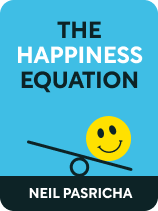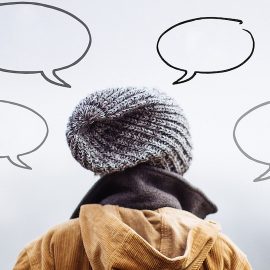

This article is an excerpt from the Shortform book guide to "The Happiness Equation" by Neil Pasricha. Shortform has the world's best summaries and analyses of books you should be reading.
Like this article? Sign up for a free trial here .
Are you looking for The Happiness Equation quotes by Neil Pasricha? What are some of the most noteworthy passages worth revisiting?
Happiness has many benefits—it positively impacts your attitude, your chances of success, and the circumstances that play out in your life. Despite knowing this, many people find it difficult to feel consistently happy. In The Happiness Equation, best-selling author Neil Pasricha claims you can overcome this difficulty by training yourself to feel happier. He explores common obstacles to happiness and provides solutions that help boost your enthusiasm for life.
Below is a selection of passages with explanations.
The Happiness Equation
In The Happiness Equation, best-selling author Neil Pasricha discusses four common obstacles that contribute to this difficulty: 1) relying on external circumstances to make you happy, 2) seeking approval from others, 3) working for the weekend, and 4) wasting mental energy. He claims that though these obstacles are pervasive, they’re surmountable: You can train yourself to feel happier.
The following The Happiness Equation quotes highlight some of his key ideas.
“Automate, regulate, effectuate all, remove decisions from your head. What are you left with? Deep thinking, questioning, wondering… Your aching brain will thank you.”
Much of what we spend time doing and thinking about is trivial. Trivial tasks and decisions contribute to stress and overwhelm as they waste your time, deplete your energy, and slow down progress on your goals. For example, deliberating over how to start an email uses up time and energy, distracts you from productive tasks, and eats into your relaxation time. But the result offers no benefits. To feel happier and be more productive, reserve your energy for things that truly matter to you by reducing the burden of trivial tasks and decisions.
“For there is nothing either good or bad, but thinking makes it so.”
According to Pasricha, the first key to happiness is training yourself to think happy thoughts, regardless of the circumstances in your life. Basing happiness on circumstances being a certain way prevents you from feeling happy. Life’s full of problems and challenges—circumstances are rarely exactly how you want them to be, no matter how hard you try to force them into place. Therefore, there’s always an excuse not to be happy. But unwanted experiences aren’t to blame for your misery—it’s how you think about them.
“There is nothing more satisfying than being loved for who you are and nothing more painful than being loved for who you’re not but pretending to be.”
When your happiness depends on external validation from others, you feel impelled to project a pleasing or impressive image of yourself that invites positive feedback. You make decisions about how to look and behave, your career, and your possessions to support this image. However, making decisions and setting goals based on how you want others to react to you creates internal conflict.
This internal conflict erodes your confidence and elicits feelings of self-contempt. You never feel like you’re good enough to receive the validation you crave because there are always new expectations to meet or ways that others appear to be doing better than you. Overall, you spend more time seeking validation and less time feeling happy with who you are.
Instead of seeking validation, focus on feeling happiness. Free yourself from the need for validation by accepting who you are and what you need to feel happy. Pasricha argues that this shift in thinking encourages a cycle of happiness: Self-acceptance inspires you to align your behaviors and decisions with what makes you happy. This alignment encourages positive self-judgment and influences you to make decisions that further increase your happiness.
Furthermore, the more you encourage positive self-judgment and engage in things that make you happy, the less time you waste thinking about how others perceive you. This helps you accept yourself exactly as you are and frees you from the pressure of adapting to please or impress others.
According to Pasricha, this increases your happiness in two ways: First, placing less weight on what others think of you decreases insecurity and self-consciousness and increases self-confidence. Second, because you’re not projecting a false image of yourself or hiding behind achievements, you feel comfortable knowing that people appreciate you for who you are, not who you’re pretending to be. This naturally improves your self-judgment, allows you to relax and enjoy being yourself, and encourages you to make decisions that continue to fuel your happiness.

———End of Preview———
Like what you just read? Read the rest of the world's best book summary and analysis of Neil Pasricha's "The Happiness Equation" at Shortform .
Here's what you'll find in our full The Happiness Equation summary :
- How to overcome the four common obstacles to happiness
- The five methods to reduce the toll of trivial tasks and decisions
- Why you need to stop chasing external validation






